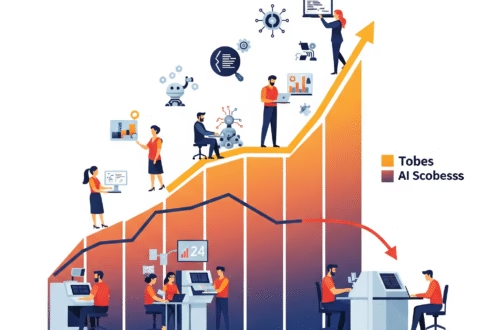Blend storytelling with artificial intelligence to lead the next generation of media innovation.

What is an AI-Assisted Journalist?
An AI-Assisted Journalist is a media professional who uses artificial intelligence tools to research, write, fact-check, and distribute news. These journalists combine human creativity and judgment with machine efficiency to deliver impactful stories faster than ever.
Why AI in Journalism is the Future
- Speed: AI helps summarize press releases, transcripts, and documents within seconds.
- Accuracy: Tools like Grammarly, Quillbot, or ChatGPT help ensure consistent tone and grammar.
- Reach: AI-driven SEO tools improve visibility, making articles rank higher on search engines.
What You’ll Be Doing
As an AI-assisted journalist, your role will include:
- Using AI tools to generate drafts, headlines, or summaries.
- Verifying AI-generated content for accuracy and bias.
- Collaborating with data scientists or analysts to produce data-driven stories.
- Enhancing multimedia content with AI tools like Descript or Synthesia.
Skills Required
- Journalism fundamentals: Reporting, storytelling, ethical writing.
- AI tools proficiency: Knowledge of GPT-4, Jasper AI, Copy.ai, and others.
- SEO and digital marketing: Understanding content optimization.
- Data literacy: Ability to interpret charts, statistics, and analytics dashboards.
Tools and Platforms You Should Learn
- ChatGPT – content ideation and summarization
- Jasper AI – blog and marketing content
- Grammarly – grammar and tone correction
- SEMrush – keyword research and SEO insights
Career Opportunities & Salary
AI-Assisted Journalism is being adopted by major publications like The Washington Post, Reuters, and Bloomberg. Entry-level roles can start around $50,000/year, with experienced AI-savvy journalists earning upwards of $100,000–$150,000/year.
Common job titles include:
- AI Content Specialist
- Automated News Editor
- AI Journalism Consultant
- Multimedia Data Reporter
Where to Learn
- Journalism AI Course – Coursera
- Knight Center for Journalism – AI Training
- Nieman Lab – Trends in journalism innovation
Real-World Examples
- Heliograf: The Washington Post’s in-house AI for sports and finance reporting.
- Reuters News Tracer: AI that identifies breaking news on social media.
- Forbes’ Bertie: AI that recommends headlines and images for articles.
Challenges in the Role
AI-Assisted Journalists must be vigilant about:
- AI bias – Ensuring generated content is factual and unbiased.
- Plagiarism risks – AI can unintentionally replicate phrases from training data.
- Human oversight – AI is a co-pilot, not a replacement.
Related Posts on UseGenix
Final Thoughts
The future of journalism lies in collaboration between human intuition and machine efficiency. As newsrooms evolve, AI-Assisted Journalists will play a central role in making news faster, smarter, and more accessible.
Stay in the loop










